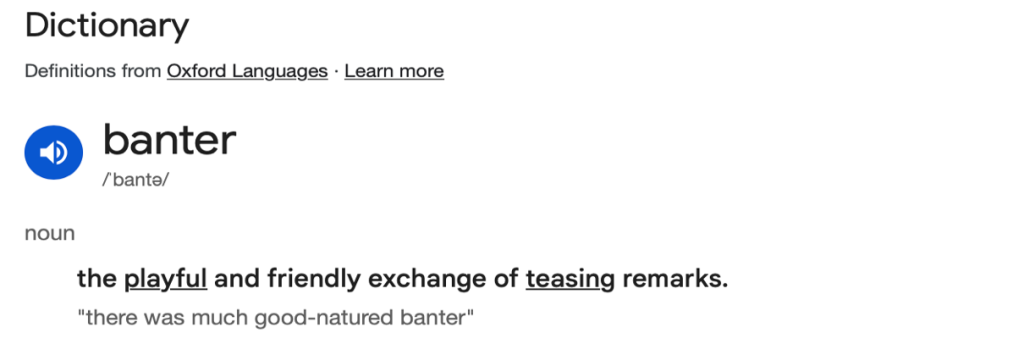Are you ready for the “banter ban”? Labour’s suggestions to amend clause 20 of the Employment Rights Bill are currently going through the House of Lords. This changes the Equality Act and will impose a legal duty on employers to “take all reasonable steps” to prevent their employees from being “harassed” by third parties.
If passed, Clause 20 would make employers liable if an employee so much as overhears a joke, comment or political opinion from a member of the public and decides to take offence. That includes remarks not directed at them, or even at anyone in particular. A single overheard comment in the “course of employment” could trigger legal risk unless the employer can prove they took “all reasonable steps” to prevent it.
In statutory terms, Clause 20 amends the Equality Act 2010 by reinstating employers’ liability for the harassment of their employees by third parties. This provision was originally included in the 2010 Act but removed by amendment in 2013. The new duty is significantly more onerous than its predecessor, and likely to cause widespread confusion, legal overreach and a huge effect on free speech.
Under the current Worker Protection Act 2023, liability already extends to employers for third-party sexual harassment, but the “harassment” we’re talking about here is verbal. Among other things, it will include conversations between customers or members of the public that are overheard by employees, not directed at them, and which they find offensive in virtue of one or more “protected” characteristics. We will keep you updated on this proposed change, but it, of course, is already creating much pushback and challenge.

That said, workplace ‘banter’ continues to pose challenges for businesses, with 57 related employment tribunal cases recorded last year.
Among the cases reported, which amounted to more than one per week, were those relating to “jokes” that included racist, sexist or homophobic elements.
One example was where an employee allegedly experienced sexual harassment masked as ‘banter’ when a colleague placed his arm around her neck and asked for a kiss, while another reportedly had crude jokes directed at him by a female co-worker. She allegedly called him “babe” and asked to be his “second/work wife”.
In another case, two employees took part in constant ‘banter’, reportedly calling each other ‘fat’ and ‘bald,’ before insulting each other’s partners.
In employment law, "banter" is a term often used to describe light-hearted joking or teasing in the workplace. However, this can become a problem when it crosses the line into bullying, discrimination, or harassment. What one person considers fun, another might interpret as offensive. As an employer, as long as you remain liable for what happens in your workplace, you need to set the rules.
A workplace where employees feel safe and respected isn’t just good practice – it’s good business. Ignoring these issues risks costly legal claims, hefty compensation payouts, and lasting reputational damage. explained that employers can be held vicariously liable for offensive remarks made by employees, even when this happens outside normal work hours or on messaging apps. It is critical that you have clear policies and training in place to prevent issues before they escalate.
Some examples of employment tribunal cases whereby respondents have unsuccessfully tried to plead that bullying or harassment was merely “workplace banter” include:
An employee of Indian origin who was called a “cheeky monkey” during a business-related round of golf (Basi v Snows Business Forms Ltd).
An employee who was teased that if he didn’t like football, he “must be gay then” (Austin v Samuel Grant (North East) Ltd).
An employee called “half-dead Dave” due to his age (Robson v Clarke’s Mechanicals Ltd).
An employee who was called a “dinosaur” due to her age and sex. (A v Bonmarche Ltd).
Under the new Workers Protection Act, all employers will have a duty to proactively take “reasonable steps” to prevent sexual harassment of their employees in the course of their employment. At My HR Hub, we have been working closely with all of our clients to create the appropriate policies and risk assessments as well as train Line Managers and employees on their duty of care and reporting mechanisms. The duty of care extends to communicating with your 3rd party touchpoints too, so this needs to be managed with care and good communication.
Workplace ‘banter’ remains a legal minefield for employers
Here are some examples of how ‘banter’ can play out in businesses:
Discrimination and Harassment
The Equality Act 2010 protects individuals from discrimination and harassment based on protected characteristics like sex, race, or sexual orientation. "Banter" that targets an individual based on these characteristics can be unlawful.
Bullying
Even if not directly linked to a protected characteristic, unkind or rude comments can still be considered bullying, potentially leading to a claim of unfair constructive dismissal.
Unwelcome Conduct
"Banter" can become unwelcome if it's not reciprocated or if the targeted individual finds it offensive.
Victimisation
Employees can be victimised if they are treated less favourably because they have reported discrimination or harassment.
Protect your business
So, what can you do to protect your business, your Managers and your employees?
Zero-Tolerance Approach
Employers should have a zero-tolerance approach to harassment and victimisation, both to comply with legal obligations and to create an inclusive workplace culture.
Clear Policies
Employers should have clear policies on equality, diversity, anti-harassment, and bullying and will need to evidence a ‘proactive’ approach to look to reduce the risk of this happening in relation to the Workers Protection Act. This means thorough risk assessments, consideration of 3rd parties and the risk of harassment and good communication to all involved.
Training
Providing equality and diversity training can help ensure that employees understand the standards expected of them and can recognise potentially problematic behaviour. For the Workers Protection Act, you need to show you have trained both your employees and Managers and repeat this ideally each year.
Responding to Complaints
Employers should have procedures in place to address complaints of bullying and harassment, this should also cover incidents of third-party harassment in relation to the Workers Protection Act.
Recognising Subtle Bullying
Employers should be aware that bullying can be subtle and not always obvious, such as through social media or emails.
Workplace "banter," while seemingly harmless, can become a source of legal problems if it crosses the line into harassment or discrimination, potentially leading to employment tribunal claims. Employers have a legal duty to prevent harassment, including offensive remarks, even if presented as "banter," and are responsible for setting and managing acceptable conduct standards.
Elaboration:
"Banter" as Harassment
The term "banter" is often used by employees and employers to justify certain behaviours, but what one person considers light-hearted joking might be seen as bullying or harassment by another, especially if it's based on protected characteristics like race, gender, or sexual orientation.
Legal Duty to Prevent
Under the Equality Act 2010, unlawful harassment occurs when unwanted conduct related to a protected characteristic has the purpose or effect of violating someone's dignity or creating an intimidating, hostile, or offensive environment. Employers are legally obligated to prevent this, including any "banter" that could be interpreted as harassment.
Employer Responsibilities
To mitigate the risk of legal claims, employers should have clear policies on acceptable conduct, including harassment, and ensure employees understand these expectations. They should also have procedures for handling complaints about inappropriate behaviour, including "banter".
If you need help with putting your compliance in place and reducing your risk and need help from our expert HR and Employment Law team, please get in touch with us at hello@myhrhub.co.uk.
